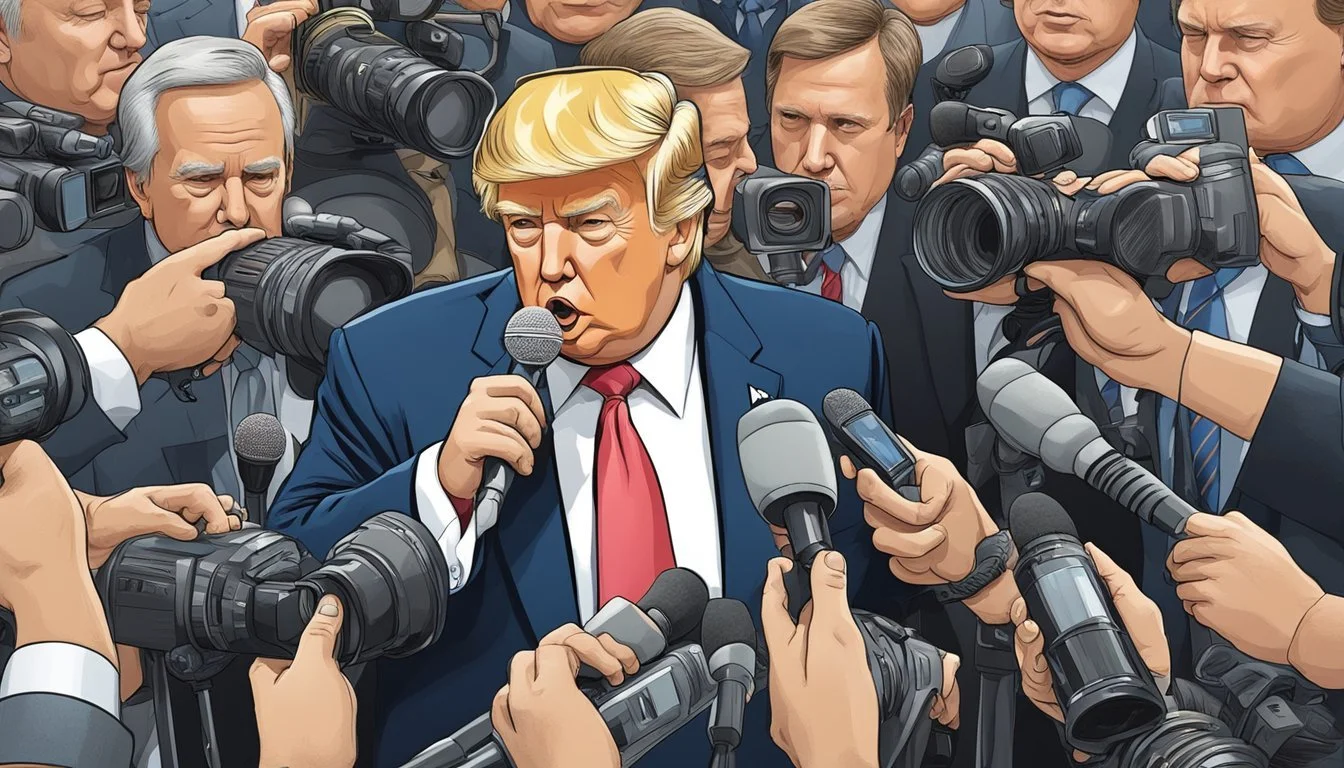Presidential Abstinence from Alcohol Examined
Former President's Beverage Habits Examined
Donald Trump's abstinence from alcohol has been a consistent aspect of his public persona. The former U.S. president has repeatedly stated that he has never consumed alcoholic beverages. Trump attributes his lifelong sobriety to the tragic experience of his older brother Freddy, who struggled with alcoholism and died at a young age.
This teetotal stance sets Trump apart in a culture where alcohol often plays a significant role in social and political gatherings. His choice to abstain has been a topic of interest, particularly given the prevalence of drinking in high-level political circles and at formal events.
Trump's sobriety aligns him with a small group of U.S. presidents who did not drink during their time in office. This decision has shaped his personal life and political image, contributing to his reputation as a businessman and leader who maintains control and clarity of mind.
Donald Trump's Stance on Alcohol
Donald Trump is known for his teetotaling lifestyle and vocal opposition to alcohol consumption. His personal experiences have shaped his views on drinking and influenced his advocacy for sobriety.
Public Statements on Drinking
Trump has repeatedly stated that he has never consumed alcohol. He attributes this choice to the tragic fate of his older brother Freddy, who struggled with alcoholism and died at a young age. In public appearances and interviews, Trump often cites his brother's story as a cautionary tale.
Trump has said, "I've never had a glass of alcohol. I've never had alcohol, for whatever reason. Can you imagine if I had? What a mess I'd be. I would be the world's worst."
Advocacy for Sobriety
Trump's personal stance on alcohol has extended to his public advocacy for sobriety. During his presidency, he addressed the opioid crisis and promoted abstinence-based approaches to substance abuse prevention.
He has endorsed the "Just Say No" campaign, originally launched by Nancy Reagan in the 1980s. Trump's approach echoes this message, advising people to avoid starting drug or alcohol use altogether.
In a 2024 Fox News interview, Trump reiterated his belief that the best way to prevent addiction is to never begin using substances in the first place.
Trump's Personal History with Alcohol
Donald Trump's abstinence from alcohol stems from deeply personal experiences within his family. His relationship with drinking has been shaped by witnessing the devastating effects of alcoholism firsthand.
Family Influence and the Impact of Fred Trump
Donald Trump's father, Fred Trump, played a significant role in shaping his views on alcohol. Fred Trump was known for his strict demeanor and emphasis on hard work. He discouraged drinking among his children, viewing it as a distraction from success. This parental influence instilled in Donald a cautious attitude towards alcohol from an early age.
Fred Trump's approach to parenting emphasized discipline and achievement. He often warned his children about the dangers of substance abuse, particularly alcohol. This early exposure to anti-alcohol messaging laid the foundation for Donald Trump's lifelong abstinence.
Trump's Brother Freddy and Alcoholism
The most profound impact on Donald Trump's relationship with alcohol came from his older brother, Freddy Trump Jr. Freddy struggled with alcoholism for much of his life, ultimately dying at the age of 42 due to complications related to his addiction.
Freddy's battle with alcohol had a deep and lasting effect on Donald. Witnessing his brother's decline firsthand, Trump developed a strong aversion to drinking. He has often cited Freddy's struggles as the primary reason for his teetotalism.
The loss of his brother reinforced Trump's resolve to avoid alcohol entirely. He has stated that Freddy's experience taught him about the genetic component of addiction, further solidifying his decision to abstain.
Cultural Context of Drinking
New York City's social scene has long been intertwined with alcohol consumption. The city's nightlife and famous establishments have played a significant role in shaping drinking culture and social norms around alcohol.
New York's Social Scene
New York's social landscape has historically centered around bars, clubs, and exclusive venues. Alcohol often serves as a social lubricant, facilitating networking and deal-making among the city's elite. Many business meetings and social gatherings take place over drinks, reinforcing the connection between alcohol and success.
The city's fast-paced lifestyle and high-pressure environments have contributed to a culture where drinking is seen as a way to unwind. Happy hours and after-work drinks are common rituals for many New Yorkers. This drinking culture extends across various social classes and professions.
Famous Watering Holes: Studio 54 and Spy Bar
Studio 54 epitomized New York's nightlife in the late 1970s. The legendary nightclub was known for its celebrity clientele, extravagant parties, and abundant alcohol consumption. It became a symbol of excess and hedonism, setting a new standard for nightlife experiences.
Spy Bar, popular in the 1990s, catered to a more exclusive crowd. Located in the Flatiron District, it was a favorite among models, actors, and the fashion elite. The venue's intimate setting and carefully curated guest list made it a prime spot for high-profile individuals to drink and socialize away from the public eye.
These iconic establishments helped shape New York's reputation as a city where alcohol and social status often went hand in hand. Their influence extended beyond the city, impacting drinking culture across the country.
Health and Social Consequences of Alcohol
Alcohol consumption carries significant risks to individual and public health. Its effects range from immediate dangers to long-term societal impacts.
Risks of Alcohol Poisoning and Addiction
Excessive drinking can lead to alcohol poisoning, a potentially fatal condition. Symptoms include confusion, vomiting, seizures, slow breathing, and loss of consciousness.
Chronic heavy drinking often results in addiction, impacting physical and mental health. It can cause liver disease, heart problems, and increased cancer risk.
Alcohol dependence disrupts personal relationships, work performance, and overall quality of life. Recovery typically requires professional help and ongoing support.
The Perils of Drunk Driving
Drunk driving remains a major public safety concern. Alcohol impairs judgment, reaction time, and coordination, drastically increasing accident risk.
In the U.S., about 28 people die daily in drunk driving crashes. Injuries and property damage add to the toll.
Legal consequences for drunk driving include fines, license suspension, and jail time. Many jurisdictions now require ignition interlock devices for offenders.
Societal Costs of Alcohol Use
Alcohol misuse strains healthcare systems and the economy. Treatment for alcohol-related illnesses and injuries consumes significant medical resources.
Lost productivity due to alcohol use costs billions annually. Absenteeism, reduced output, and alcohol-related unemployment contribute to this figure.
Alcohol-fueled crime and violence create additional societal burdens. Domestic abuse, assault, and public disorder often involve alcohol as a factor.
The Teetotal Lifestyle
Abstaining from alcohol can profoundly impact one's life, health, and relationships. Individuals who choose this path often experience various benefits while facing unique challenges.
Benefits of Being Teetotal
Teetotalers often report improved physical health. They typically have lower risks of liver disease, certain cancers, and cardiovascular problems. Mental clarity and emotional stability are common advantages, as alcohol can impair cognitive function and mood regulation.
Financial savings are another significant benefit. The money not spent on alcohol can be redirected to other pursuits or investments. Teetotalers may also find they have more productive time, as they avoid hangovers and alcohol-induced fatigue.
Social interactions can become more genuine and meaningful without the influence of alcohol. Many teetotalers report forming deeper connections and having more authentic conversations with others.
Cultivating Resilience and Willpower
Choosing a teetotal lifestyle requires strong willpower, especially in social situations where drinking is common. This practice can strengthen one's overall self-discipline and decision-making skills.
Resilience is built through consistently choosing sobriety in challenging situations. Teetotalers often develop coping mechanisms and stress management techniques that don't rely on alcohol.
Setting and achieving personal goals becomes easier without the interference of alcohol. This can lead to increased self-esteem and a sense of accomplishment.
The Role of Sober Friends in Recovery
For those recovering from alcohol addiction, having sober friends is crucial. These relationships provide understanding, support, and companionship without the temptation of alcohol.
Sober friends can offer practical advice and strategies for maintaining sobriety. They often share similar experiences and challenges, creating a strong bond.
Engaging in alcohol-free activities with sober friends can help redefine social norms and create new, positive associations. This support network is invaluable in building a fulfilling teetotal lifestyle.
Alcohol in the Context of Trump's Brand
Donald Trump's teetotalism contrasts sharply with some of his business ventures and personal habits. His abstinence from alcohol has become intertwined with his public image and marketing choices.
Trump Vodka: A Branding Paradox
Trump Vodka launched in 2006, presenting a curious juxtaposition with Trump's well-known sobriety. The product bore Trump's name and trademark "Success Distilled" slogan. Despite Trump's personal abstinence, he promoted the vodka as "the epitome of vodka" that would "demand the same respect and inspire the same awe as the international legacy and brand of Donald Trump himself."
The vodka ceased production in 2011 due to poor sales. Critics noted the irony of a non-drinker promoting an alcohol brand. Trump defended the venture, stating it aligned with his business philosophy of attaching his name to luxury products.
Marketing Sobriety: The Diet Coke Preference
Trump's preference for Diet Coke has become a notable aspect of his public persona. He reportedly consumes up to 12 cans daily. This habit aligns with his teetotal image while still associating him with a popular beverage brand.
Trump's Diet Coke consumption has been featured in interviews and observed during public appearances. The White House even installed a custom call button for Trump to summon Diet Coke on demand.
This preference has been used to reinforce Trump's image as a businessman who stays alert and focused. It also serves as a relatable trait for many Americans who share a fondness for soft drinks.
Portrayal of Trump's Drinking in Media
Donald Trump's abstinence from alcohol has been a frequent topic in media coverage. His public statements and personal history regarding alcohol consumption have attracted significant attention and analysis from various news outlets.
Coverage of Trump's Abstinence from Alcohol
Many media reports have highlighted Trump's claim of never consuming alcohol. News outlets often cite his brother Freddy's struggle with alcoholism as the primary reason for Trump's sobriety. The tragic death of Freddy Trump at age 43 is frequently mentioned in these stories. Some articles have explored Trump's business ventures in the alcohol industry, noting the contrast with his personal abstinence.
Journalists have also reported on Trump's interactions at social events where alcohol is served. His preference for Diet Coke or other non-alcoholic beverages is often mentioned. Media coverage sometimes includes anecdotes from associates confirming Trump's teetotaler status.
Media's Interpretation of Trump's Alcohol-Related Comments
Trump's statements about alcohol have been subject to media scrutiny and interpretation. His comments on the dangers of alcohol abuse are often linked to his family history. Some outlets have analyzed Trump's rhetoric on substance use in relation to his policy positions.
Media reports sometimes question the consistency of Trump's statements on alcohol. Fact-checking articles have examined claims about his lifelong abstinence. Commentators have discussed how Trump's sobriety influences public perception of his character and decision-making abilities.
Interviews where Trump discusses his views on alcohol receive particular attention. Media analysis often focuses on how these comments align with his public persona and political messaging.
Sociocultural Impact of Prominent Figures' Drinking Habits
The drinking habits of public figures can significantly shape societal views on alcohol consumption and related policies. Their choices often resonate beyond personal preferences, influencing public discourse and cultural norms.
Influence on Public Perception of Alcohol
Celebrity drinking behaviors can sway public attitudes towards alcohol. When high-profile individuals abstain, it may normalize sobriety and challenge drinking culture. For example, Donald Trump's teetotalism, rooted in his brother's tragic experience with alcoholism, has sparked discussions about abstinence.
Public figures who drink moderately may promote responsible consumption. Conversely, those with alcohol-related scandals can highlight the dangers of excessive drinking. Media coverage of these habits can amplify their impact, potentially affecting alcohol sales and consumption patterns.
Celebrity endorsements of alcoholic beverages can also shape brand preferences and drinking trends among their followers.
Impact on Alcohol-Related Policies
The stance of political leaders on alcohol can influence policy decisions. Teetotal politicians may advocate for stricter alcohol regulations or support addiction recovery programs. Their personal experiences often inform their policy positions.
Alcohol-related incidents involving public figures can prompt calls for tighter regulations or enforcement. High-profile DUI cases, for instance, may lead to stricter drunk driving laws or increased public awareness campaigns.
Politicians' drinking habits can affect their electability and public trust. Voters may view sobriety as a sign of discipline and good judgment, potentially impacting election outcomes and policy priorities related to alcohol regulation and public health initiatives.






